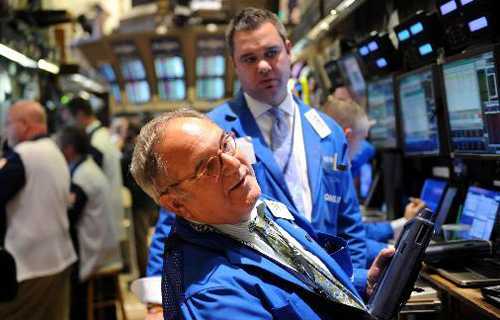|
 |
|
Traders work on the floor of the New York Stock Exchange in New York, Nov. 3, 2010. Wall Street swung to gain on Wednesday after the U.S. Federal Reserve announced a plan to buy 600 billion U.S. dollars more in Treasury bonds (SHEN HONG) |
An announcement earlier this month by the U.S. Federal Reserve to buy $600 billion worth of Treasury bonds has been widely criticized by many countries, including China.
Experts argue that the new quantitative easing (QE) policy aimed at stimulating the U.S. economy will have no obvious result. On the contrary, experts say that it will produce negative effects for the economy as well as the international monetary system.
Lack of support
The Federal Reserve's newest economic stimulus policies will expand asset bubbles in the United States, said Chen Fengying, head of the Institute of World Economic Studies, which is part of the China Institute of Contemporary International Relations.
"The U.S. stock market will rebound within a short time, for40 percent of Americans invest in stocks. Private investors will pour more money into the stock market in a short period. But the U.S. economy, with its current low rate of growth, will not get support from real industries," Chen said in the Beijing Evening News.
It will be difficult to create an economic resurgence in the U.S. simply by relying on a second round of QE policies, she said.
The first round of QE policy came just after global financial services firm Lehman Brothers Holdings Inc. filed for Chapter 11 bankruptcy protection in September 2008. The incident marked the largest bankruptcy filing in U.S. history.
U.S. consumption of luxury goods has declined significantly, despite the country's high consumption demands. As the financial center of the U.S., Wall Street has to adopt to this trend and tighten its monetary policies, Chen said.
Inevitable influx
The new policy will produce few results for the U.S. economy in such a short period, but the quantitative money will rapidly flow to other financial markets, leading to currency revaluation in those countries, said Li Daokui, a member of the Monetary Policy Committee of China's central bank, the People's Bank of China. Although a lot of money will flow into China, the country should not panic, since the impact will be smaller than that felt by Brazil and India, Li said to Beijing Evening News.
"Increasing the supply of U.S dollars at such an excessive speed will bring potential risks to the international financial system. Attention should therefore be focused on the risks of asset bubbles, the operation of financial institutions and cash flow issues," Li added. China's monetary policy should change from a relaxed position to a more stable one after the economy's growth rate steadies itself, Li said.
Negative impact on interest rate increase
China will not adjust its monetary policies just because of changes in the United States, said Yi Xianrong, Deputy Director at the Institute of Finance and Banking of the Chinese Academy of Social Sciences. Monetary policies will be gradually tightened, however; China will increase its interest rates if the consumer price index (CPI) continues to grow, Yi said.
The QE policy runs counter to China's monetary policy. It is predicted that the policy will weaken the effect of China's interest rate increase, which occurred in October of this year. Experts have said that the new policy will not invigorate weak economic growth in the U.S., but will instead create conditions for hyperinflation.
Global effects
The policy decision has received a great deal of criticism overseas. The U.S. dollar has declined to a record low against other currencies since the beginning of November. The new policy has also fueled soaring prices in oil, gold and stock markets worldwide.
U.S. dollar devaluation is expected to keep exchange rates down and force other currencies to revalue, said Wu Donghua of the China International Economic Cooperation Society. "The move will dilute state assets in countries that are holding and reserving U.S. dollars as part of their assets," Wu said.
Chen believes that the new round of QE policy has indirectly made the world economic resurgence start to go off the tracks. Chen said that the influx of money to emerging economies has ballooned assets in those countries.
Germany's Finance Minister Wolfgang Schäuble criticized the U.S. Federal Reserve's decision as "making extra trouble" for the world.
"It is not consistent when the Americans accuse China of exchange rate manipulation and then make the dollar exchange rate artificially lower," Wolfgang said in the British Financial Times.
The financial ministries of 21 member countries of the Asia-Pacific Economic Cooperation (APEC) criticized the quantitative easing policy at an APEC meeting held in Japan earlier this month. They expressed their worries for the new QE policy, and were concerned about the decreasing value of the U.S. dollar.
Fending off the surge
How should developing countries deal with the current situation? "The current priority is not to lower the leverage rates of banks, but to fend off the surge of money, so as to prevent the influx from damaging the economy," Xia Bin, Director of the Development Research Center of the State Council said in the Beijing Evening News.
Developing countries should not be satisfied with the current fiscal policies of larger developed countries, Xia said. They should actively take part in and call for a series of actions to improve the international currency system.
As a country that holds a large amount of international hard currency, the United States should consider its global role while making its own domestic policies.
"Developing countries should seek a stable exchange rate mechanism for large countries' currencies," said Xia.
| 